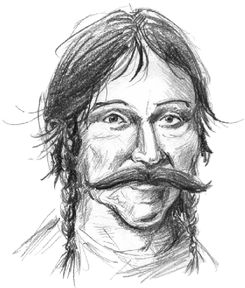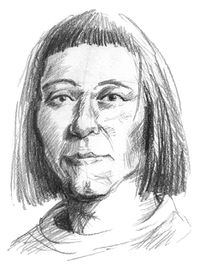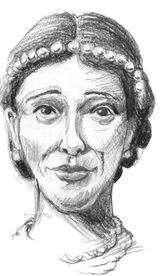How Mrs. Claus Saved Christmas (9 page)
Read How Mrs. Claus Saved Christmas Online
Authors: Jeff Guinn

“I think we have to trust Nicholas's instincts, and he wants Attila and Dorothea to join us,” I replied. “We'll watch Attila carefully, because he's used to fighting with anyone he meets. And it will be nice for me to have another woman to talk to.”
In fact, our two new friends fit in right away. Because he'd had to study so many maps while planning battles, Attila knew his way around better than the rest of us. Dorothea was very kind and, though soft-spoken, quite intelligent. By the time we crossed the channel to Englandâa monk named Patrick happened to be floating by in a small boat on his way to Ireland and offered us a rideâwe were all enjoying one another's company very much, except for Attila and Felix, who constantly argued with each other. But these arguments were entertaining, and kept the rest of us amused as we traveled.
We loved England immediately, for it had the greenest hills and clearest streams any of us had ever seen. Sadly, the lives of the people there did not match the beauty of their land. There was fighting everywhere, with fierce tribes in the north and west constantly assaulting the people of the central and southern regions. At the same time, Saxons from across the sea often sailed over to conduct raids. Why, we kept asking each other, couldn't everyone stop fighting and begin enjoying the wonderful world given to them by God? Then Attila would remind us that too many people measured themselves by how much they could take from others.
“I was like that,” he would always point out. “Though I'm pleased to have learned giving gifts is more satisfying than owning things myself, it was a hard-earned lesson. But if I can learn it from you, then others can, too.”

Attila
Almost everyone in Britain was desperately poor. Though we'd arrived with plenty of money, very little food or clothing was for sale. What we did find in sad marketplaces were old, stringy vegetables, and sandals and blankets so filthy and tattered that beggars in other parts of the world would have disdained them. So we had to arrange to buy proper gifts like cheeses and dried fruits and well-made blankets from markets in Europe, and have these shipped by boat over to Britain. Then we paid English farmers to let us store these things in their barns. So long as we paid in advance, no one ever asked us why we were doing this. They were just grateful for the few extra coins.
And yet, with the awful fighting and nearly universal poverty, there was still something special about this country. If the people were poor, they were also hopeful, certain that somehow, some way, they would eventually live in peace. Instead of moping in times of trouble, they made up songs and stories about wonderful heroes who would one day come to their rescue. For fifty years we wandered among them, leaving our gifts when we could, trying to avoid battlefields and hoping along with all the ordinary folk that better times for them would soon be coming.
Around the year 500, a British war chief named Arthur won several spectacular victories against Saxon invaders. Many people in Britain believed he must be the longed-for hero who would save the land, but Attila told us that there was no chance Arthur could hold off the Saxons for very long.

Arthur
“There are too many of them,” he said, looking rather sad. “This Arthur is a brave man and a great leader, but anyone who fights constantly must eventually lose to someone stronger. This is true now, and will be throughout history. I only hope he escapes with his life.”
With our help, Arthur did. One day we found him lying badly wounded in a barn, with his Saxon enemies all around. Obviously, we couldn't leave him there, and he became our sixth member. After he recovered, Arthur proved to be a very good addition to the group. He was brave, as Attila had guessed, and quite resourceful, too. He could carve wood book covers even better than Felix, and his love for his country despite its terrible wars was sincere.
I believe it was because of Arthur that Britain remained so important to us all. For the next six hundred years we divided our time between that island nation, Europe, and Asia Minor, meeting people and giving gifts and trying always to bring a little joy and comfort to children who most desperately needed reminding that the world was not entirely a cruel, dangerous place. All of us were happy anywhere we went, but it was during our visits to Britain that Arthur seemed the most content.
“Though battles and invasions continueâthe Saxons who conquered my people are now being challenged in their turn by the Normans sailing in from FranceâI know that the English people themselves are especially noble in spirit,” Arthur said one night as we gathered around a campfire in the hills outside the town of London, which had originally been built by the Romans a thousand years earlier. “If peace ever comes to this land, the rest of the world will look to Britain for inspiration and leadership.”
Britain itself often looked to Arthur for inspiration, though the man of its legends had little in common with the war chief who'd joined us. Ordinary people comforted themselves in times of troubleâand, in Britain, it seemed always to be a time of troubleâwith tales of Arthur the mythical king, who defeated enemies with the help of a magic sword and the advice of a wizard. There were tall tales about Nicholas and Attila, too, but the stories about Arthur were, at this time, the most widespread. We would tease him about them, always understanding that if they brought some comfort to frightened people, then they were good rather than harmful.
We had great adventures in Britain and everywhere else we went. My husband, Nicholas, wrote about many of these in his own book, so in most cases I won't repeat them here. It was our great good fortune to be befriended by Charlemagne, the king of the Franks who became the leader of the Holy Roman Empire. Thanks to his generosity, we were less dependent on carving and selling wooden book covers to pay for our gifts and travel costs. We studied with great interest events in far-off landsâhow a man named Muhammad, for instance, founded the religion of Islam, and how there were rumors that Viking sailors had crossed a great ocean and discovered some vast, fertile new land. Though we could not travel to these places yetâour gift-giving services were so badly needed where we wereâNicholas, Felix, and I declared that someday we would explore them for ourselves. Arthur's main interest was Britain; Attila and Dorothea remained especially devoted to Europe and Asia Minor.
Sometime in the middle of the twelfth century, the nature of our mission changed. We still gave gifts, but of a different sort. As Britain, Europe, and Asia continued to be torn by warâthe latest flare-ups were called “the Crusades,” with Christian rulers raising armies to march to Jerusalem and try to take back that holy city from the Muslimsâour efforts to bring comfort and happiness to children began to seem almost foolish. If we left food, it was eaten and gone in a day or two. Cloaks and sandals wore out, if the children didn't outgrow them first. The times people of all ages had to live in seemed to be getting worse rather than better. What difference did our gifts of a little food or new clothing make, really?
One night in 1194, Nicholas called us together for a full, honest discussion. We all agreed something had to be done differently. We couldn't do much to lessen the violence of the world, but at least we could find a way to carry out our own mission more effectively. I spoke for a while about the difference between the body and the spirit. Food and clothing were temporarily good for the body, but we needed to give gifts that gave more lasting comfort to the spirit. It was Dorothea, the quietest among us, who eventually made the best suggestionâshe thought we should give gifts of toys instead. Now, at this time toys were not something every child, or, indeed, many children, actually owned. Those that existed were very primitiveâmarbles made of clay, hoops fashioned from bits of wood, dolls carved from wood or sewn together from rags. But the more we thought about it, the more sense the idea of giving toys made. Bread or fruit would be gone after one meal; children could play with toys for years, and in the process forget, at least for a while, about the dangerous world all around them.

Dorothea
We couldn't purchase toys as we could buy cloaks or loaves of bread. There were no companies that made them, no stalls full of toys in city marketplaces. So we learned to make them ourselves, and it took some time. The first dolls Dorothea and I sewed looked more like socks or mittens than pretend people. Our earliest attempt to make marbles found us using the wrong sort of clay, so they didn't roll straight and then broke on the rare occasions that they actually hit the other marbles at which they were aimed. Still, with some practice we were able to craft toys at the same incredible speed with which we'd been able to carve book covers. We took this as a sign that we should keep trying, and finally we made some that we considered good enough to take to Rome, where we offered them for sale at a market. We sold everything, dolls and marbles and hoops, within minutes, and at a good enough profit to buy materials to make hundreds more. We left those as gifts for poor children in Naples to the south of Rome. The next morning we returned to their neighborhood, and how wonderful it was to see boys and girls shouting with sheer joy as they shot their marbles or played with their dolls or rolled hoops across the meadow.
“Perhaps they're still wearing rags, and too many of them will go to bed hungry tonight,” I said. “But for now, they're happy, and tomorrow they'll still have their toys to play with. We must keep on giving gifts of toys.”
“Then we have to keep making them,” Felix observed. “That's going to be the hardest part. Food and clothing we can buy anywhere and give away the same day. Crafting toys is far more complicated. It will be impossible for us to have some to give away every night, no matter how fast we work.”
Though we wouldn't realize it for another three hundred years, the solution to that problem was already in progress. Gradually, people in Britain and Europe were defining specific dates when special gift-giving was most appropriate. Today, many people think that Santa Claus or St. Nicholas or Pere Noel or Father Frostâthe name is different in almost every countryâsimply selected December 6 or 25 or January 6 as the day he brings gifts to children. In fact, those dates were picked for us.
Forget the word
Christmas
for just a moment. Though not known by that name, the date of December 25 became especially holy in the Christian church in the early 300s, when it was arbitrarily selected as the day to celebrate the birth of Jesus. That date was borrowed from other, earlier religions. Mithra, the Persian god of light, supposedly had been born on December 25. The Romans traditionally enjoyed a weeklong celebration called Saturnalia from December 17 through 24. They had parties and ate special food and gave each other little gifts. When Christianity became the official religion of Rome in the 300s, people still wanted their holiday. In 350, just seven years after my husband supposedly died in Myra, Pope Julius I used December 25 as Jesus' birthday on the new Roman calendar. Of course, the holiday was intended from the start as a special time to give thanks to God for sending Jesus, and not everyone carried over the old Saturnalia tradition of giving gifts on that date. But many people did. In some places, grown-ups began giving small presents to children on January 6, called Epiphany, and supposedly the day that the three Wise Men arrived in Bethlehem to give their gifts to Baby Jesus.
Christmas
for just a moment. Though not known by that name, the date of December 25 became especially holy in the Christian church in the early 300s, when it was arbitrarily selected as the day to celebrate the birth of Jesus. That date was borrowed from other, earlier religions. Mithra, the Persian god of light, supposedly had been born on December 25. The Romans traditionally enjoyed a weeklong celebration called Saturnalia from December 17 through 24. They had parties and ate special food and gave each other little gifts. When Christianity became the official religion of Rome in the 300s, people still wanted their holiday. In 350, just seven years after my husband supposedly died in Myra, Pope Julius I used December 25 as Jesus' birthday on the new Roman calendar. Of course, the holiday was intended from the start as a special time to give thanks to God for sending Jesus, and not everyone carried over the old Saturnalia tradition of giving gifts on that date. But many people did. In some places, grown-ups began giving small presents to children on January 6, called Epiphany, and supposedly the day that the three Wise Men arrived in Bethlehem to give their gifts to Baby Jesus.
Other books
Hellblazer 1 - War Lord by John Shirley
Still Life with Elephant by Judy Reene Singer
Burning Proof by Janice Cantore
Chronospace by Allen Steele
Bible of the Dead by Tom Knox
AnchorandStorm by Kate Poole
George Brown and the Protector by Duane L. Ostler
My Neighbor's Will by Lacey Silks
The Precipice by Paul Doiron
Heart of the Unknown Alpha by Scott, Rae